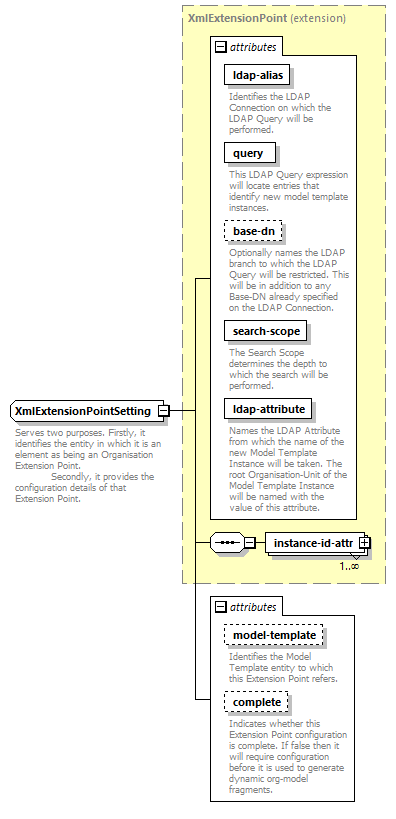| diagram |  |
||||||||||||||||||||||||||||||||||||||||||||||||||||||||||||||
| namespace | http://base.api.de.bpm.tibco.com | ||||||||||||||||||||||||||||||||||||||||||||||||||||||||||||||
| type | extension of XmlExtensionPoint | ||||||||||||||||||||||||||||||||||||||||||||||||||||||||||||||
| properties |
|
||||||||||||||||||||||||||||||||||||||||||||||||||||||||||||||
| children | instance-id-attr | ||||||||||||||||||||||||||||||||||||||||||||||||||||||||||||||
| attributes |
|
||||||||||||||||||||||||||||||||||||||||||||||||||||||||||||||
| annotation |
|
||||||||||||||||||||||||||||||||||||||||||||||||||||||||||||||
| source | <xs:complexType name="XmlExtensionPointSetting"> <xs:annotation> <xs:documentation>Serves two purposes. Firstly, it identifies the entity in which it is an element as being an Organisation Extension Point. Secondly, it provides the configuration details of that Extension Point. </xs:documentation> </xs:annotation> <xs:complexContent> <xs:extension base="XmlExtensionPoint"> <xs:attribute name="model-template" type="xs:string"> <xs:annotation> <xs:documentation>Identifies the Model Template entity to which this Extension Point refers.</xs:documentation> </xs:annotation> </xs:attribute> <xs:attribute name="complete" type="xs:boolean" default="true"> <xs:annotation> <xs:documentation>Indicates whether this Extension Point configuration is complete. If false then it will require configuration before it is used to generate dynamic org-model fragments.</xs:documentation> </xs:annotation> </xs:attribute> </xs:extension> </xs:complexContent> </xs:complexType> |
attribute XmlExtensionPointSetting/@model-template
| type | xs:string | ||
| annotation |
|
||
| source | <xs:attribute name="model-template" type="xs:string"> <xs:annotation> <xs:documentation>Identifies the Model Template entity to which this Extension Point refers.</xs:documentation> </xs:annotation> </xs:attribute> |
attribute XmlExtensionPointSetting/@complete
| type | xs:boolean | ||
| properties |
|
||
| annotation |
|
||
| source | <xs:attribute name="complete" type="xs:boolean" default="true"> <xs:annotation> <xs:documentation>Indicates whether this Extension Point configuration is complete. If false then it will require configuration before it is used to generate dynamic org-model fragments.</xs:documentation> </xs:annotation> </xs:attribute> |
WSDL documentation generated by XMLSpy WSDL Editor http://www.altova.com/xmlspy